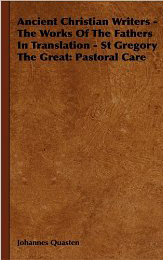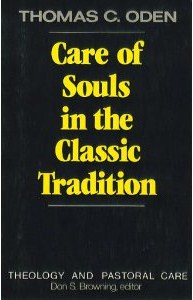 christian,
christian,  counseling,
counseling,  gregory,
gregory,  gregory the great,
gregory the great,  history,
history,  leadership,
leadership,  ministry,
ministry,  pastor,
pastor,  pastoral care,
pastoral care,  theology in
theology in  Book Review
Book Review In the past, I would post only book reviews pertinent to worship, music in the local church, or general Christian leadership and discipleship. Recently, I've been studying many more general topics as well, such as history, economics and scientific thought, some of which end up as reviews here as well.
 Tuesday, February 1, 2011 at 12:35PM
Tuesday, February 1, 2011 at 12:35PM  Pastoral Care is an ancient volume written by Pope Gregory the Great in 591AD. It was written to instruct pastors on the details of their office, warnings to those entering its service and extensive instructions on how to administer spiritual care to parishioners. The primary content of the book is a systematic listing of methodologies for how to evaluate and speak to Christians under the pastoral care of the reader. The methodologies, called admonishments, contain two basic components in each. First, each admonishment contains a paradoxical evaluation of two kinds of people. These are categorizations of the types of people a pastor will encounter. While they are fairly simplistic in name, it is their simplicity that makes them especially effective as diagnostic tools. Each admonishment begins with a listing of the two paradoxical types of people that will be dealt with. A pastor can use those types to help him find (within Gregory’s extensive treatise) and diagnose the kind of person he is trying to help. Second, each admonishment also contains a specific and detailed account of how to treat each person described therein. Especially clear is the assumption that Gregory feels his coverage of the subject as a whole should be sufficient for almost any situation, and he approaches it is an analogous manner to a physician, employing the metaphor extensively, and acting as a instructor to spiritual physicians.
Pastoral Care is an ancient volume written by Pope Gregory the Great in 591AD. It was written to instruct pastors on the details of their office, warnings to those entering its service and extensive instructions on how to administer spiritual care to parishioners. The primary content of the book is a systematic listing of methodologies for how to evaluate and speak to Christians under the pastoral care of the reader. The methodologies, called admonishments, contain two basic components in each. First, each admonishment contains a paradoxical evaluation of two kinds of people. These are categorizations of the types of people a pastor will encounter. While they are fairly simplistic in name, it is their simplicity that makes them especially effective as diagnostic tools. Each admonishment begins with a listing of the two paradoxical types of people that will be dealt with. A pastor can use those types to help him find (within Gregory’s extensive treatise) and diagnose the kind of person he is trying to help. Second, each admonishment also contains a specific and detailed account of how to treat each person described therein. Especially clear is the assumption that Gregory feels his coverage of the subject as a whole should be sufficient for almost any situation, and he approaches it is an analogous manner to a physician, employing the metaphor extensively, and acting as a instructor to spiritual physicians.
One topic which Gregory deals with that I was particularly impressed by was his understanding of giving. He states it this way:
For when we administer necessities to the needy, we give them what is their own, not what is ours; we pay a debt of justice, rather than do a work of mercy..[1]
His discourse on giving is one of the most extraordinary I have seen. Though not without objectionable points, he perfectly applies a surgical knife to misguided thought about giving when he states:
"[one] gives of his bread to an indigent sinner, not because he is a sinner, but because he is a man. In doing so one actually nourishes a righteous beggar, not a sinner, for he loves in him not his sin but his nature." [2]
Though the work is vastly important and helpful to the pastoral office, it is not without its questionable suggestions:
The married must be admonished to bear in mind that they are united in wedlock for the purpose of procreation, and when they abandon themselves to immoderate intercourse, they transfer the occasion of procreation to the service of pleasure. Let them realise that though they do not then pass beyond the bounds of wedlock, yet in wedlock they exceed its rights. Wherefore, it is necessary that they should efface by frequent prayer what they befoul in the fair form of intercourse by the admixture of pleasure.[3]
Sadly, Gregory’s pre-medieval understanding of the marriage bed will only serve as a template to plunge the church and its leadership into 1300 years of further angst and castigation against sexual fulfillment through marriage in specific, and anything sexual in general.
Product Link : Ancient Christian Writers - The Works Of The Fathers In Translation - St Gregory The Great: Pastoral Care
Review by Kim Gentes
[1]Johannes Quasten, “St Gregory The Great: Pastoral Care” in Ancient Christian Writers - The Works Of The Fathers In Translation, translated Henry Davis, SJ (Westminster, MD: Newman Press, 1950), Pg 159
[2]Ibid., Pg 155
[3]Ibid., Pg 188
 christian,
christian,  counseling,
counseling,  gregory,
gregory,  gregory the great,
gregory the great,  history,
history,  leadership,
leadership,  ministry,
ministry,  pastor,
pastor,  pastoral care,
pastoral care,  theology in
theology in  Book Review
Book Review  Tuesday, February 1, 2011 at 12:15PM
Tuesday, February 1, 2011 at 12:15PM  Care of Souls was an excellent book that introduces a history of pastoral care. In it Thomas Oden reviews the current state of modern pastoral caregiving (as of 1984). In his first section of the book, he broadly covers what he sees as some deficiencies in current practices, especially related to the concentration on psychological therapies being incorporated into the pastoral sphere of practice. Oden adds warnings about the ineffectiveness of these therapies (both in application by experts in that field, but also in the specific realm of church pastoral care). Warnings about the secular incorporation of care therapies being introduced into the pastoral field are coupled with a short explanation of lack of influence from the classical literature of the Christian tradition on the same pastoral leaders. Oden presents his concern that the psychotherapies are replacing the historically proven methods of the classical pastoral care writings and wisdom. This was a surprising (and impactive) concept that I took from the book- the idea that psychological methods were replacing pastoral care among pastors. Oden states it this way:
Care of Souls was an excellent book that introduces a history of pastoral care. In it Thomas Oden reviews the current state of modern pastoral caregiving (as of 1984). In his first section of the book, he broadly covers what he sees as some deficiencies in current practices, especially related to the concentration on psychological therapies being incorporated into the pastoral sphere of practice. Oden adds warnings about the ineffectiveness of these therapies (both in application by experts in that field, but also in the specific realm of church pastoral care). Warnings about the secular incorporation of care therapies being introduced into the pastoral field are coupled with a short explanation of lack of influence from the classical literature of the Christian tradition on the same pastoral leaders. Oden presents his concern that the psychotherapies are replacing the historically proven methods of the classical pastoral care writings and wisdom. This was a surprising (and impactive) concept that I took from the book- the idea that psychological methods were replacing pastoral care among pastors. Oden states it this way:
What curious fate has befallen the classical tradition of pastoral care in the last five decades? It has been steadily accommodated to a series of psychotherapies.[1]
In the second main section of the book Oden gives a brief biography of Gregory the Great, the pope who lived in the 6th and early 7th centuries. This overview was helpful in understanding the context and time of Gregory’s life and his impact on the broader church and western world.
The final section of the book is specifically dedicated to a sketch of the main findings taken from Gregory’s most well known writing, “Pastoral Care”. He covers a myriad of topics, all sourced in Gregory’s treatise. Of particular importance to Oden was Gregory’s keen mind, analytical abilities, and dialectic model of teaching pastors how they might evaluate, diagnose and administer pastoral care. Oden, queuing from Gregory, fixates most of this section on the paradoxical personality and behavioural traits taken on by major styles of people. It is almost uncanny, the level of perceptive understanding that Gregory reveals almost 1400 years before modern psychology would draw some similar conclusions about personalities, behaviours and understanding of the inner self.
One point that was significant to me in this section was the idea that the key to proper pastoral critique is to draw analogies and arch-types, allowing the person to see themselves in such symbolisms allowing the to make personal discovery of their own faults based on their own conscience. Oden say it succinctly here:
The pastor proceeds by analogy so that the person being challenged will come up with a self-judgment based on the person's own conscience... Enabling one's conscience to become transparent to oneself constitutes a more significant pastoral service than harangue or castigation.[2]
Oden reviews many other concepts of Gregory’s extensive and insightful pre-modern study of the human soul and emotions, and his practical help for pastors who are working to care for them. It is an excellent book with little questionable or objectionable materials.
Product Link: Care of the Souls in the Classic Tradition (Theology and pastoral care series)
Review by Kim Gentes
[1]Thomas C. Oden, Care of Souls in the Classic Tradition (Philadelphia, PA: Fortress Press, 1984), Pg 28
[2]Ibid., Pg 90